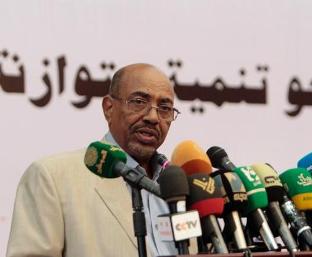Sudan’s NCP hints at possibility of reinstating fuel subsidies
November 23, 2013 (KHARTOUM) – The ruling National Congress Party (NCP) suggested today that the government could reconsider a decision it implemented last September by which it scaled down fuel subsidies which raised gasoline and diesel prices by more than 60%.

The two-day forum which brings together economic experts, politicians, business leaders and others seeks to find solutions to the economic troubles engulfing the east African nation.
He noted that the first forum has called for lifting subsidies as a way of addressing Sudan’s fiscal imbalances.
Sudanese officials have said that the country faces bankruptcy unless it slashes subsidies which is eating up a large chunk of the already shrinking budget.
After South Sudan’s independence in mid-2011, Khartoum lost access to more than three-quarters of the oil reserves that were the main driver of an economic boom that lasted for much of the last decade.
Since then the government has struggled with a shortage of hard currency and revenue as the pound sank in value on the widely used black market and inflation soared.
Inflation rate officially reached 40% last month.
On Saturday, the Sudanese president Omer Hassan al-Bashir has called for a battle against inflation as part of efforts to reform the country’s economy.
Bashir, who addressed the opening session of the economic forum, urged the participants to offer radical solutions for the economic crisis which brought the country to an edge of a cliff.
The president called for conducting an evaluation of the banking system and the monetary policies besides making the necessary recommendations to mitigate the impact of the economic and fiscal reform on the lower classes of the society.
He also challenged the conferees to come up with proposals that would help raise the standard of living, tackle poverty, and fight causes of prices hikes.
“We must fight high market prices which affect the economy and the people,” Bashir said
Bashir also called for narrowing the development gap between the centre and the peripheries, demanding an analysis of the true causes behind the low production and productivity.
He stressed the need to identify the obstacles and difficulties facing the expansion of the private sector’s role in the economy as well as setting priorities for the partnership between the public and the private sectors.
Bashir further called for evaluating Sudan’s foreign economic relations and determining the economic policy guidelines required for expanding and activating relations with the international community.
He asked the participants to make the necessary recommendations for increasing foreign currency reserves, bridging the resource gap, and resolving foreign debts problem.
The chairman of the preparatory committee of the economic forum, Tijani Al-Sissi, criticized the recent government decision to lift subsidies on fuel and other commodities and said that it wouldn’t resolve the economic crisis, stressing the need for a comprehensive economic program.
Last September, the Sudanese government launched a new austerity package which included lifting fuel subsidies which almost doubled prices of gasoline and diesel. The cabinet also raised the US dollar exchange rate for importing purposes to 5.7 pounds compared to an official rate of 4.4.
Later the government acknowledged that it devalued the official exchange rate and not just the one for importing purposes.
The Sudanese pound is now trading at 8 SDG to the dollar on the black market.
Al-Sissi implored upon the government to adopt the outcomes of the forum, pointing that it would be meaningless if its recommendations were not implemented.
The minister of finance, Ali Mahmoud Abdel-Rasool, for his part, stressed the need to overcome the obstacles facing the economy, pointing to the government’s will to achieve balanced economic development and the optimal use of resources.
The head of the Sudanese Businessmen and Employers Federation (SBEF), Saud Al-Birair, pointed that the large presence of the economists and politicians reflects the government’s belief in the views of the experts and specialists in order to overcome the current economic crisis.
He said that private sector played important role in achieving high economic success in the world’s top growing economies and stressed to the significant legislative and policy gains obtained by the private sector during the current regime, pointing to the need for implementing those policies and legislations in reality.
(ST)
